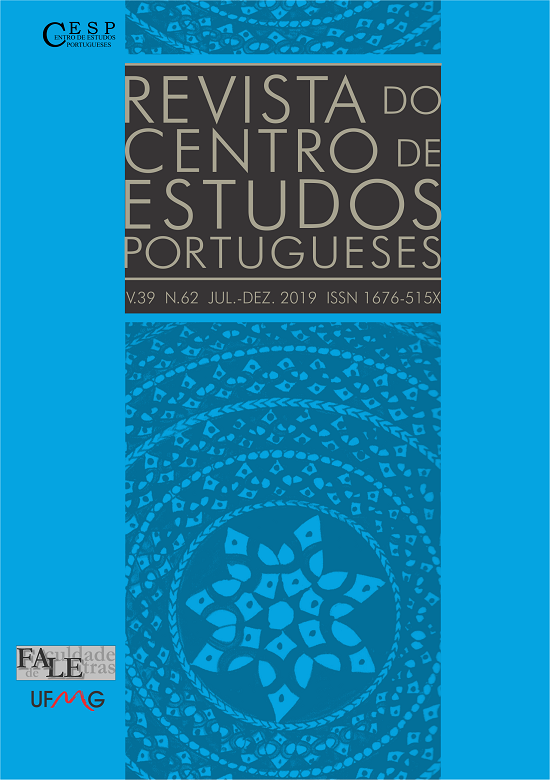Proposta intermidiática de crítica expandida a partir da plasticidade sonoroverbal de “Clorântida”, de Rosalina Marshall / Intermedial Proposal of Expanded Criticism from the Sonorous-Verbal Plasticity of “Clorântida”, by Rosalina Marshall
DOI :
https://doi.org/10.17851/2359-0076.39.62.257-261Mots-clés :
Rosalina Marshall, plasticidade sonoroverbal, intermidialidade, crítica expandida, sonorous-verbal plasticity, intermediality, expanded criticism.Résumé
Resumo: Este trabalho trata das relações entre o poema-livro “Clorântida”, de Rosalina Marshall, e sua leitura musicada, apresentando-se sob um formato que é em si mesmo condizente com o tema da intermidialidade (CLÜVER, 2006; MÜLLER, 2012). Tal metaestudo delineia-se por meio de um vídeo, que confere a este trabalho o direito imprescritível de ser teoria exercida enquanto prática. É nessa imbricação entre diferentes tipos de mídias e linguagens que se pode tecer uma “crítica expandida” (FREITAS; PEREIRA, 2015) como a aqui proposta. A abordagem audiovisual de “Clorântida” entrega ao leitor-espectador a plasticidade sonoroverbal de seus versos, fazendo deste trabalho também um “bloco de sensações” (DELEUZE; GUATTARI, 2010), situado no limiar entre o debate e a fruição. É limítrofe também a relação do poema em questão com a língua, do que pode insurgir a indagação: “Isto é português?” – ao que Marshall talvez responderia: “A harmonia entre pássaros e homens é mágica e essencial. Na música, encontramos a protolinguagem que une todos os seres vivos. O poema, como a música, pode ser também isso, essa união que transcende a moralidade de todas as gramáticas.” (MARSHALL, 2019). Por essa via, em “Clorântida”, a autora des-dobra a língua portuguesa, atravessando-a e ultrapassando-a, como uma espécie de “gagueira” na escrita (DELEUZE, 2011) que escapa à postura policialesca tentada a desvendar o significado de suas “frases plásticas” (SANTOS; REZENDE, 2011). Tal corporalidade da palavra, inscrita no ritmo sonoro e na materialidade gráfica do poema, é potencializada pela leitura em voz alta performada pela poeta (BARTHES, 1973).
Palavras-chave: Rosalina Marshall; plasticidade sonoroverbal; intermidialidade; crítica expandida.
Abstract: This experiment deals with the relationship between the poem-book “Clorântida”, by Rosalina Marshall, and its musical reading, presenting itself in a suitable format to the theme of intermediality (CLÜVER, 2006; MÜLLER, 2012). Such meta-study is delineated through a video, which confers to this experiment the imprescriptible right to be the theory put into practice. In this imbrication among different types of media and languages it can weave a “expanded criticism” (FREITAS; PEREIRA, 2015) as the one proposed here. The audiovisual approach of “Clorântida” gives to the reader-spectator a sonorous-verbal plasticity of its verses, making this experiment also a “set of sensations” (DELEUZE; GUATTARI, 2010), situated on the threshold between the debate and the aesthetic fruition. The relation of the poem in question with the language is also borderline, of which it can be raised the question: “It is Portuguese?” So, to this Marshall might answer: “The harmony among birds and men is magical and essential. In the music, we find the protolanguage that unites all living beings. The poem, as the music, can also be this, the union that transcends the morality of all grammars.” (MARSHALL, 2019). In this way, in “Clorântida”, the author un-folds the Portuguese language, crossing it and surpassing it, as a kind of “stuttering” in writing (DELEUZE, 2011) that escapes the vigilant stance tempted to unravel the meaning of its “plastic sentences” (SANTOS; REZENDE, 2011, p. 20). The aloud reading performed by the poet enhances the corporeality of the word that is inscribed in the sonorous rhythm and graphic materiality of the poem (BARTHES, 1973).
Keywords: Rosalina Marshall; sonorous-verbal plasticity; intermediality; expanded criticism.










